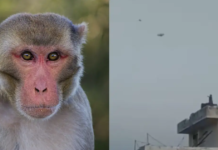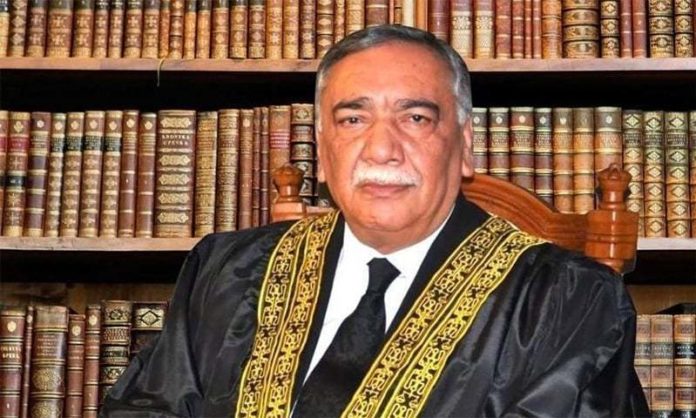The Supreme Court on Wednesday asked the federal government to furnish a report detailing cases of individuals interned in seven centres that were referred to review boards for extending their detention or sending to courts for decisions.
“Simply satisfy the court on whether the cases of the individuals in the internment centres were being referred to review boards for extension of their detention,” observed Chief Justice Asif Saeed Khosa, heading a five-judge larger SC bench. The case will vanish if the court became convinced that fundamental right applies to the detained persons, he observed.
The directive came during the hearing of a petition moved by PPP stalwart Farhatullah Babar, right activists Afrasiab Khattak, Bushra Gohar and Rubina Saigol, challenging the Khyber Pakhtunkhwa Action In Aid of Civil Powers Ordinance 2019.
Additionally, the court had taken up the federal government’s appeal against the Oct 17, 2018, Peshawar High Court declaration of the ordinance as ultra vires.
“We are concerned about every person in detention centres because they are the citizens of Pakistan,” the chief justice observed; pointing towards Attorney General (AG) Anwar Mansoor, he said that being the principal law officer of the country, the latter should ensure whatever was being done was in accordance with the Constitution and the law.
Tuesday’s hearing saw an exchange of words between Justice Qazi Faez Isa and the AG. Justice Isa was concerned that the AG was not answering the queries being raised.
“Are we to help you or it is your job to assist the court?” Justice Isa asked.
“I am trying to answer what I have been asked,” the AG said.
When the AG explained that the federal government declared who is the enemy of the state and India may have been declared the enemy state, the chief justice observed that it was the federal government that always declares someone as the enemy state. He recalled how a debate started asking how India could be given the most favoured nation status, when it had been declared the enemy.
At this, Justice Isa inquired of the AG whether he was correct in understanding that India was an enemy state. If yes, how, Justice Isa asked, adding that before declaring some person as an “enemy alien”, his case has to be referred to the special court. The judge regretted that the AG “responds to queries by saying that he will provide the relevant document later”.
The AG retorted that he could not argue in this situation. “This is why I have objected to the presence of Justice Isa in the bench on the first day of hearing,” he said.
Chief justice-designate Justice Gulzar Ahmed intervened by asking the AG to calm down since he was before the court to argue.
“We have complete respect for your office but since you are arguing the case, you have to be courteous. You are here to make submissions and not to fight,” Justice Ahmed observed.
The case at hand concerns the liberty of citizens, the chief justice observed, saying that with one stroke of the pen, the positions of Fata and Pata had been changed but nobody bothered to ponder in writing while amending the Constitution: all laws will apply as earlier in the area.
Justice Ahmed asked the AG to furnish a concise statement, adding that the judiciary has engaged its office to research the matter.
The chief justice observed that all people should be dealt with in accordance with the law.
At the outset of the hearing, Justice Ahmed asked the AG to consider Article 10(9) of the Constitution which would improve matters in explaining that the ‘enemy’ the government was encountering was ‘alien’.
Justice Isa observed that “alien” refers to those who are not citizens of Pakistan.
The AG explained that it was impossible to identify who was a citizen since there was lot of border crossing, besides ‘enemy intrusion’. Most of the people living there also do not have identity cards, he said.
Will the authorities release them from the internment centres if an individual did show his identity card or his name in the voters’ list, asked the chief justice.
The AG contended that it was very difficult to ascertain the citizenship of people of that area.
“You cannot make assumptions that those living in Fata are enemy aliens,” Justice Isa said, adding that a person’s status has to be decided upon under some provision of the law.






























